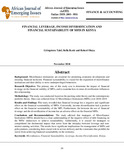FINANCIAL LEVERAGE, INCOME DIVERSIFICATION AND FINANCIAL SUSTAINABILITY OF MFIS IN KENYA
Abstract
Background: Microfinance institutions are essential for promoting economic development and
ensuring financial inclusion. Financial sustainability is crucial for the expansion of microfinance
institutions and their ability to serve underprivileged borrowers.
Research Objective: The primary aim of this study was to determine the impact of financial
leverage on the financial stability of MFIs, and to examine how revenue diversification influences
this relationship.
Methodology: The study was conducted based on the pecking order theory and the contemporary
portfolio theory. Data was collected from 32 Microfinance Institutions (MFIs) over 2010-2019.
Results and Findings: The study revealed that financial leverage has a negative and significant
effect on the financial sustainability of MFIs. Conversely, income diversification had a positive
effect on the financial sustainability of the MFI. Furthermore, the between the use of financial
leverage and the diversification of income has an adverse effect on the financial MFIs.
Conclusions and Recommendations: The study advised that managers of Microfinance
Institutions (MFIs) should have a clear understanding of the negative effect of debt financing on
the MFIs' endeavours to achieve sustainability. Additionally, it is crucial for managers to
comprehend the detrimental impact that arises from the interplay between leverage and noninterest earning activities. The results have significant implications for management of MFIs and
policymakers, considering their crucial role in service delivery and the constraints that prohibit the
sector from achieving financial sustainability in the economy.

